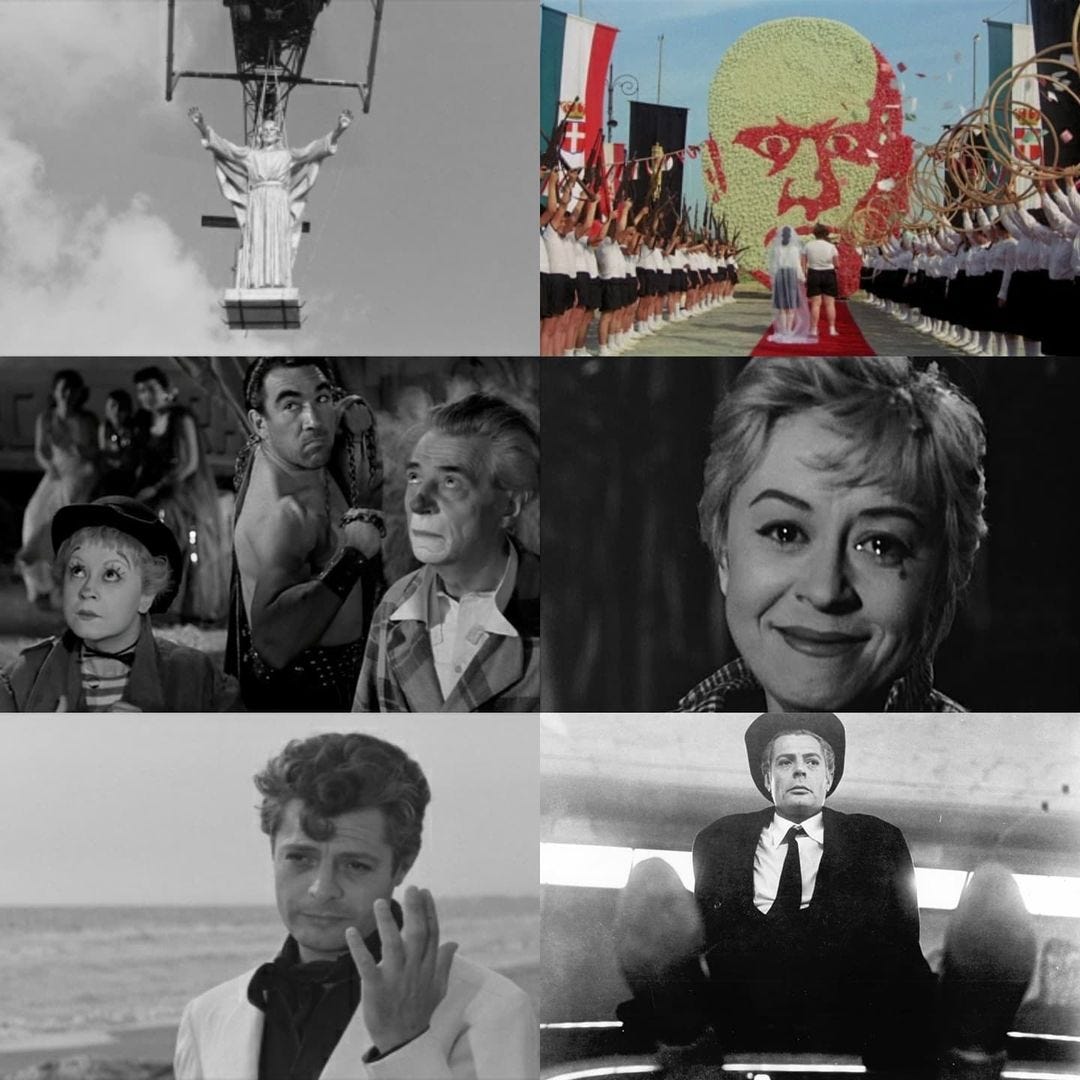FEDERICO FELLINI’s CINEMA
Federico Fellini, a canonical name of personal expression and artistic fantasy in the cinema, had no technical training in his profession. Born in the seaside town of Rimini in Italy in 1920, he quit the provinces of Rome at age 18. Enrolled in law school, he abandoned the degree.
Young Fellini supported himself as a wandering caricaturist until hired by Marc Aurelio in 1939. The cartoons, caricature sketches, and radio comedy that were his popular art metier brought him to the cinema as a gagman and script-writer.
Fellini trained as a professional life as a visionary with over 10 years of scriptwriting and on-the-set apprenticeship. He redefined his artistic credo to "looking at reality with an honest eye- but any kind of reality; not just social reality. but also spiritual reality, metaphysical reality, and anything man has inside him.
What to expect and Where to start?
Federico Fellini not only made enchanting films but also had a fascinating life. He believes in the supernatural and strange realms. He was fascinated by different faces and not their stories but his own stories about them—that vivid imagination and dreams, when cut down into pieces, gave us a world of their own, which were Fellini films. Just like most intelligent filmmakers, his films don't follow the usual routine but go beyond it. As Fellini once said, "Don't try to understand or interpret my films; just try to listen to what I want to say".
If you are not gonna binge every Fellini Film chronologically, then in this particular order watch these 4 films and proceed to his other films
La Strada
Nights of Cabiria
La Dolce Vita
8 1/2
TRILOGY OF THE SPIRITS
LA DOLCE VITA - 8 1/2 - JULIET OF THE SPIRITS
People often talked about the surrealist, mystical, and sometimes occult nature of Fellini's films and how it impacted a larger part of his work. These three films play a significant role in the rest of Fellini's life and work by searching for his most innate curiosity of discovering existence beyond life. La Dolce Vita, which Fellini once Fellini referred to as a stirring sequel to I Vitteloni, in which the character arrives in Rome and becomes a reporter, leads from one episode to another, covering his experiences and feelings in a movie. As simple as it looked from a spectator's eyes, it was layered, with different realms uncovering themselves with every watch. Fellini masterfully used his camera to split the material and spiritual worlds of La Dolce Vita. The purpose of Marcello was to stand detached from his materialistic desires and surroundings, but the ending was not at all conclusive that he got what he wanted, yet there was a spot that remained untouched by many, which was a detachment of the spirit, which is shown through a rupture of point of view through several scenes. In simple words, Fellini created a ghostly realm of spirits, which also follows through to 8 1/2, where Guido is still in crisis, confusing reality with dreams and dreams with reality. Again, there is a desire to be free, and hence, in this film, Guido has an accepting and liberating ending. Is Fellini bringing this ghostly realm and reality closer together? In Juliet of the Spirits, Giulietta, almost a counterpart of Guido, going through an identity crisis, has this gift of seeing spirits and ghosts from her past, with whom she reconciles. In the end, Fellini was always interested in after-death experiences and spirits, and this fascination of his gave birth to a whole new ghostly realm from one film to another, and that's what makes his cinema magical, mystical, supernatural, and enlightening.
QUICK THOUGHTS QUICK THOUGHTS QUICK THOUGHTS
QUICK THOUGHTS QUICK THOUGHTS QUICK THOUGHTS
Every film fan, at one point or another, comes to Fellini's work. His most popular films are 81⁄2 (1963) and La Dolce Vita (1960), which are also an introduction to his work for many. I had an immediate bond when I saw La Dolce Vita for the first time, which drove me to binge on his films. That connection was transcendental and something I couldn't explain to myself, and this happened to me for the first time, so that's how I found my favorite film of all time. Then I started watching Fellini's films chronologically and noticed the patterns in his work. His every single film asks a question that is beyond life and walks in paths of a different reality, and that is the reason why his films sometimes feel misguided, very distant, or confusing to certain people. For example, 81⁄2 was rejected by so many people at their first watch but gained respect on a new level when rewatched. Another problem associated with his films was post-synchronized dialogue, which also confused me when I watched 8 1/2 for the first time, but if you went head-on knowing how the dialogues were going to work, it wouldn't take you much time to settle into the film. Fellini was famous for exaggerating his fantasies and objectifying women, and he accepts that most of the time. In his films, I don't think that he endorsed objectification or forced a political ideology of women or machismo on his protagonists, but rather showed his own experiences. With all respect, I loved his passion and enthusiasm for making films. There is always a Fellini film for everyone; for me, it was La Dolce Vita, and I bet there will be something for you too.
FILMMAKERS RECOMMENDED BY FEDERICO FELLINI
CHARLIE CHAPLIN
BUSTER KEATON
LAUREL & HARDY
THE MARX BROTHER
LUIS BUNUEL
DW GRIFFITH
SERGEI EISENSTEIN





